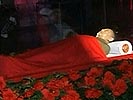 North Korean state-run television announced Monday that longtime leader Kim Jong-il died Saturday at the age of 69, after reportedly suffering a heart attack while traveling on a train. Under his leadership, North Korea became a nuclear state and was widely known as one of the most repressive societies in the world. Kim Jong-il’s youngest son, Kim Jung-un, is expected to become North Korea’s new leader, but it is unclear if his ascendancy will bring about any real changes, as Kim Jong-il ruled North Korea in concert with a large circle of regime insiders who remain at the helm. We look at how the Korean Peninsula is the most militarized region on earth and what this means in this transition of power. "Given the past history of animosity and confrontation between the two Koreas, our government has taken precautionary measures to stabilize the situation," says Chung-in Moon, professor of political science at Yonsei University in Seoul, South Korea, and former government official who twice met with Kim. Meanwhile, "there’s a kind of reverence for Kim Jong-il by the people, because the North Korean people have a deep sense of needing sovereignty and independence," notes Christine Ahn, executive director of the Korea Policy Institute. She says North Koreans recall 35 years of Japanese occupation and were proud of "joining the nuclear club" in order to prevent what they perceive as U.S. military occupation and the division of the Korean Peninsula.
North Korean state-run television announced Monday that longtime leader Kim Jong-il died Saturday at the age of 69, after reportedly suffering a heart attack while traveling on a train. Under his leadership, North Korea became a nuclear state and was widely known as one of the most repressive societies in the world. Kim Jong-il’s youngest son, Kim Jung-un, is expected to become North Korea’s new leader, but it is unclear if his ascendancy will bring about any real changes, as Kim Jong-il ruled North Korea in concert with a large circle of regime insiders who remain at the helm. We look at how the Korean Peninsula is the most militarized region on earth and what this means in this transition of power. "Given the past history of animosity and confrontation between the two Koreas, our government has taken precautionary measures to stabilize the situation," says Chung-in Moon, professor of political science at Yonsei University in Seoul, South Korea, and former government official who twice met with Kim. Meanwhile, "there’s a kind of reverence for Kim Jong-il by the people, because the North Korean people have a deep sense of needing sovereignty and independence," notes Christine Ahn, executive director of the Korea Policy Institute. She says North Koreans recall 35 years of Japanese occupation and were proud of "joining the nuclear club" in order to prevent what they perceive as U.S. military occupation and the division of the Korean Peninsula.Video
Source: Democracy Now!
No comments:
Post a Comment